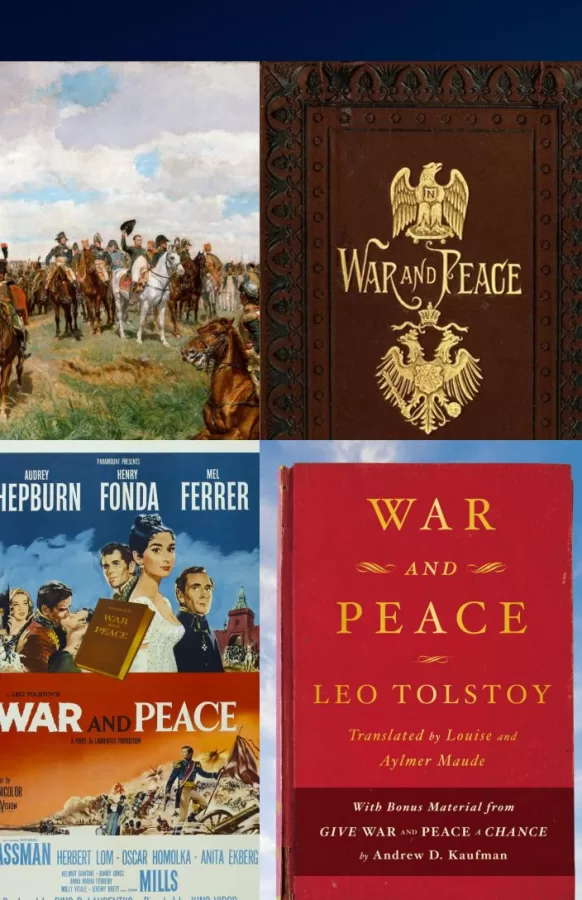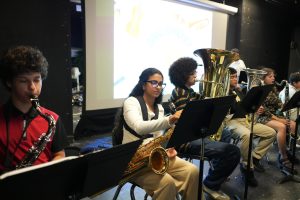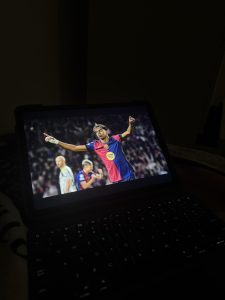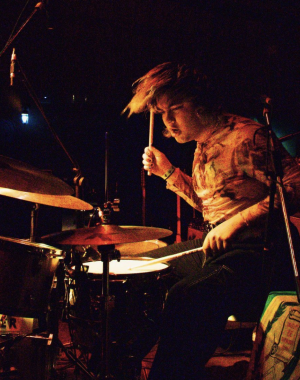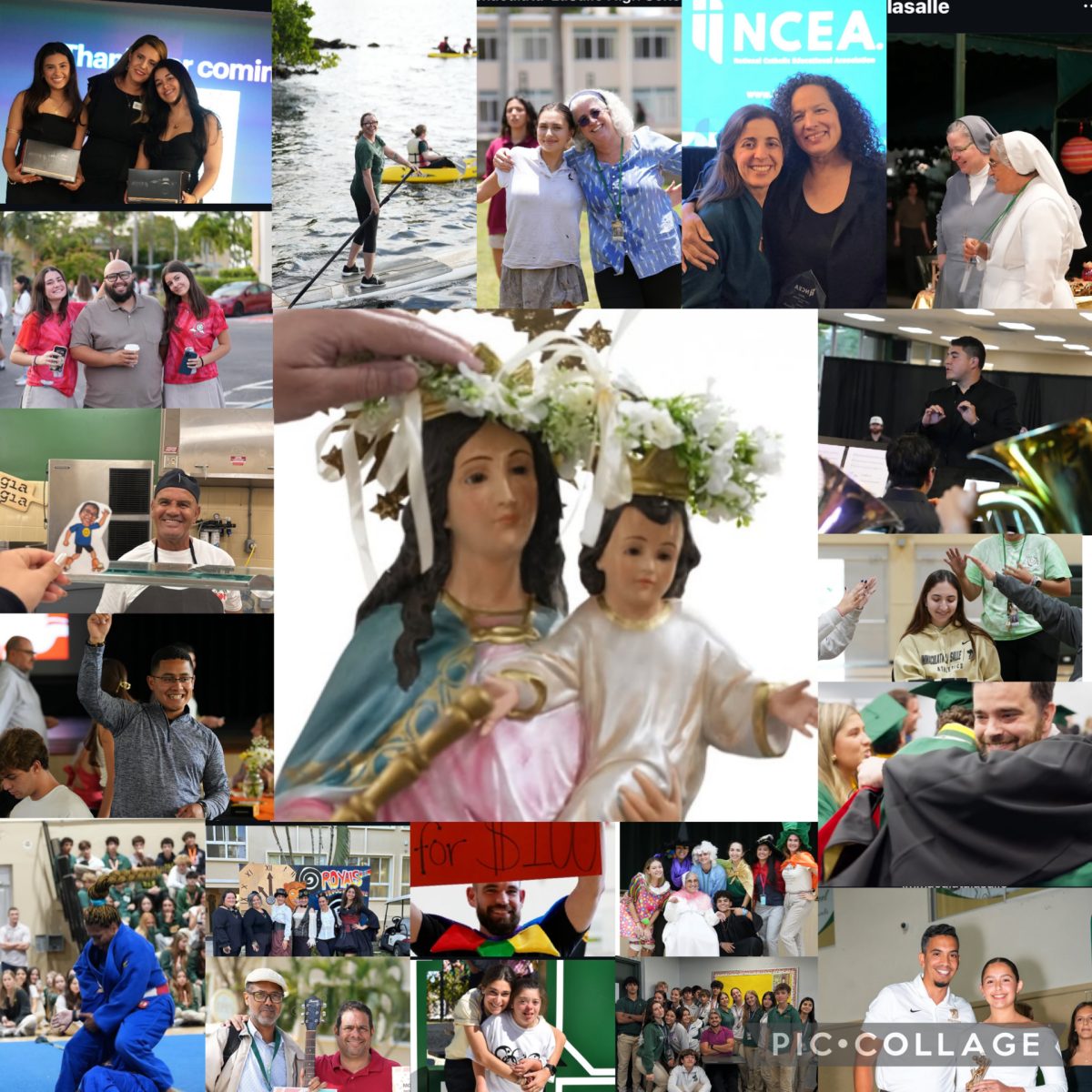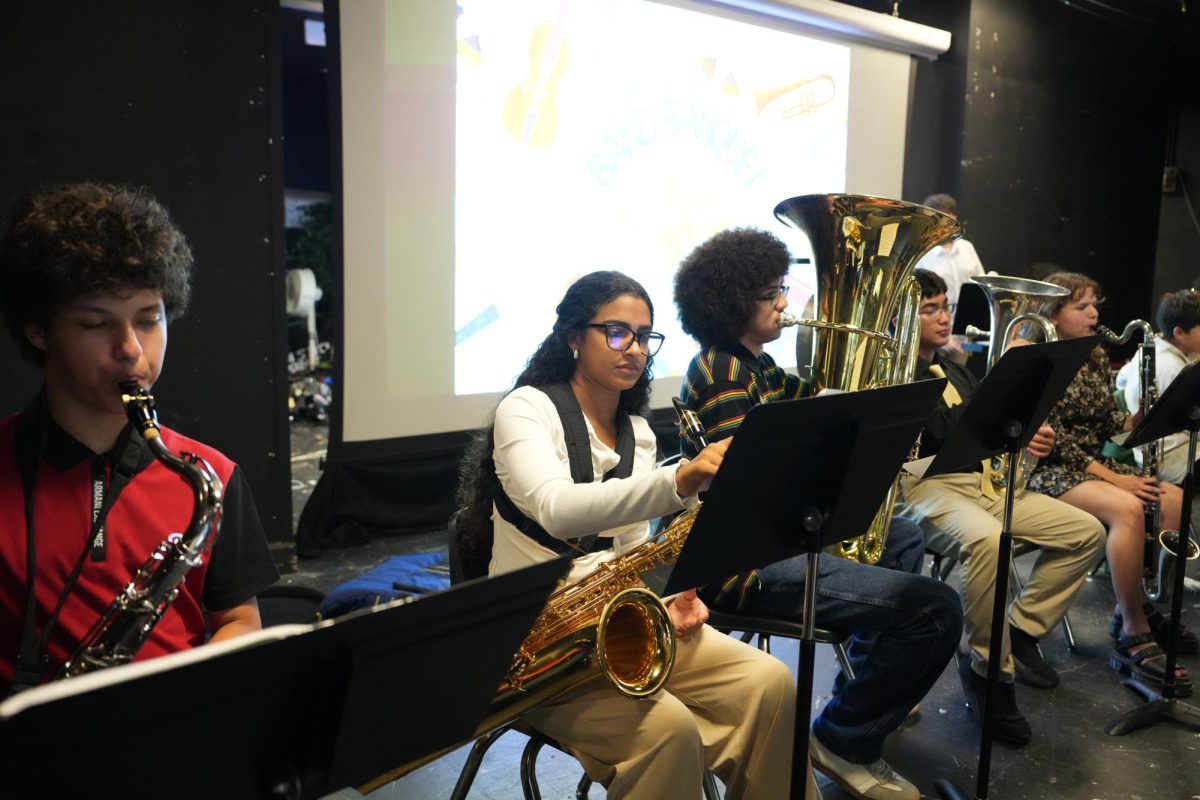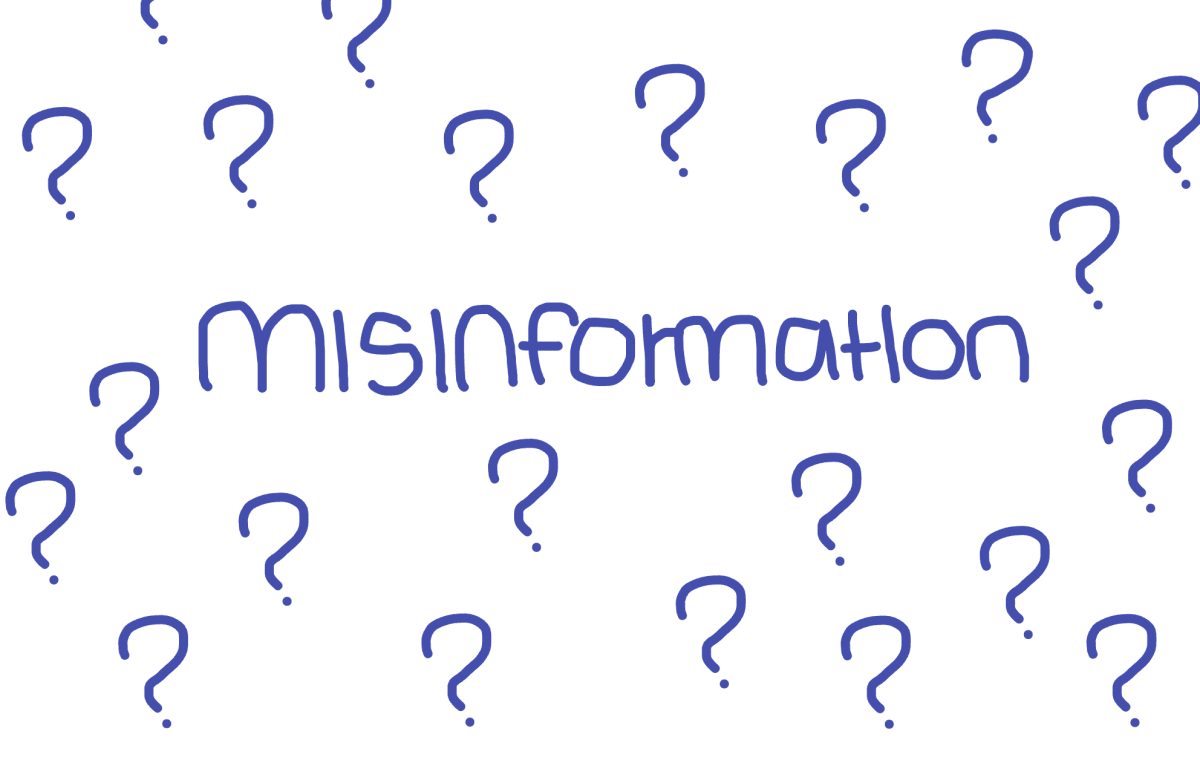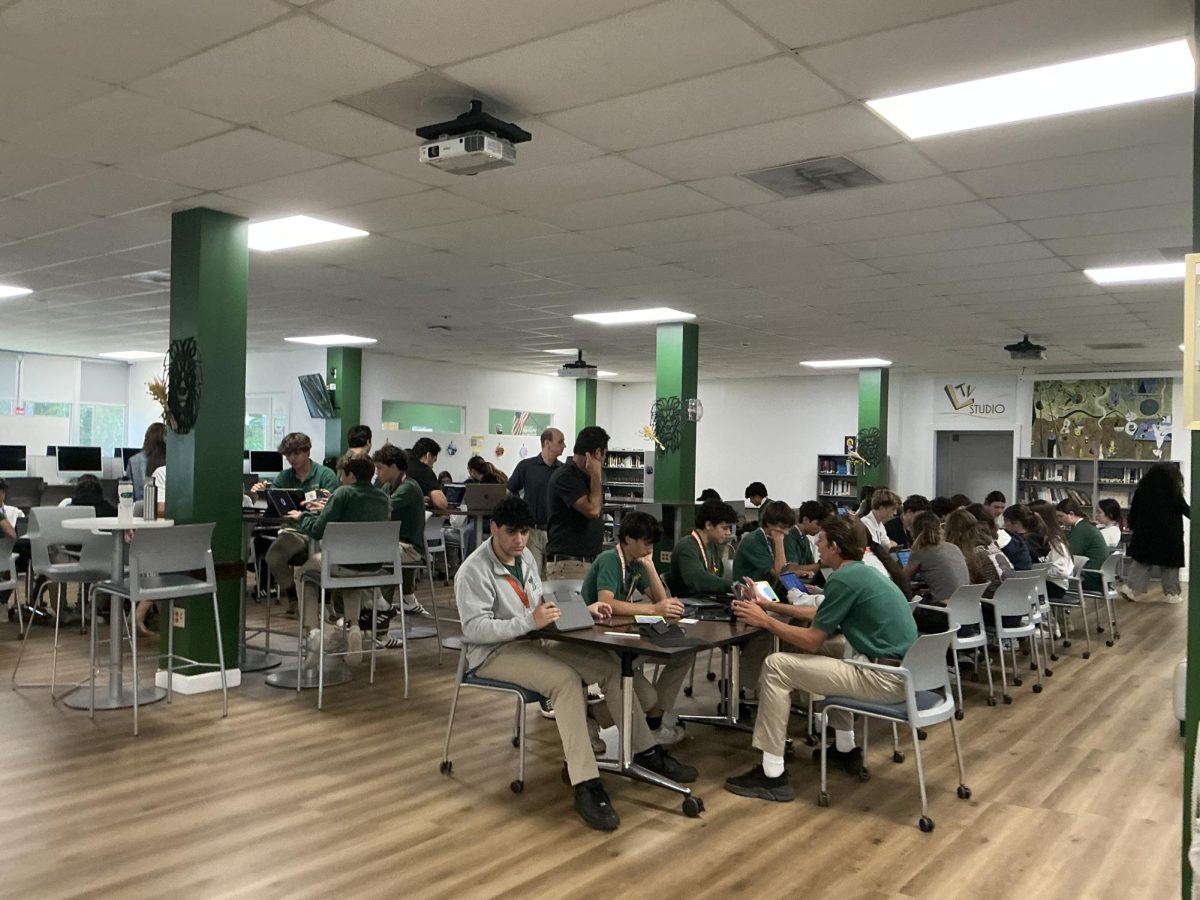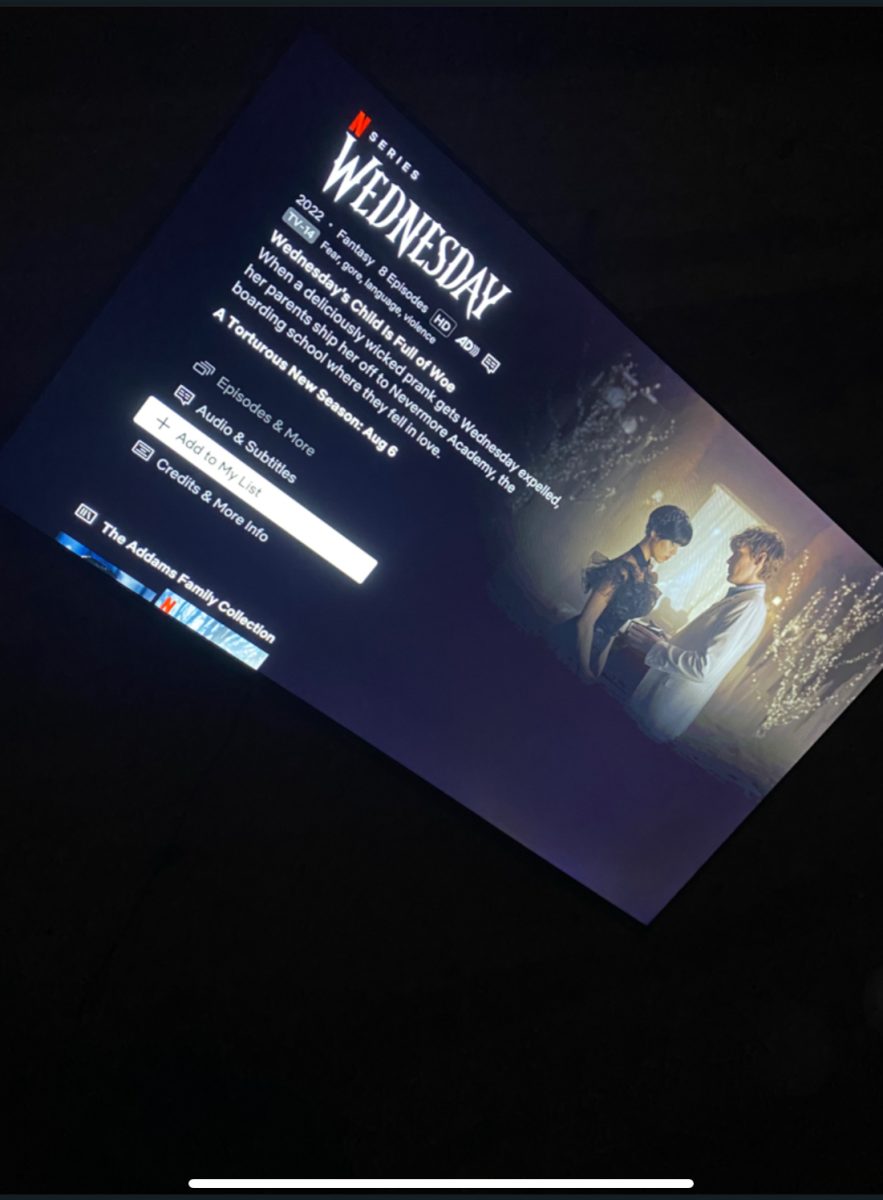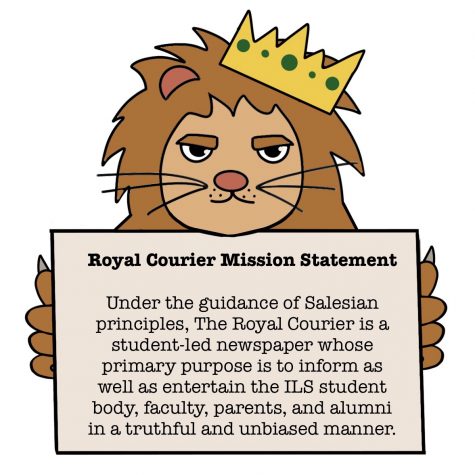Why You Should Read War and Peace
Photo Illustration by Ms. Cristina Ramirez
With its long history, War and Peace has been reprinted and turned into film as well as TV versions.
March 8, 2023
1,215 PAGES!
Leo Tolstoy’s 1869 War and Peace is an epic at 587,287 words, 361 chapters, four volumes, and split into three
parts.
Over the past year, with many breaks, I finished reading the book.
So, what exactly is this classic novel about?
War and Peace follows over 500 characters in Russia during Napoleon Bonaparte’s
invasion of 1812. The plot centers around their interpersonal lives, involvement in the war,
and how they change in reaction to the war.
THREE MAIN CHARACTERS
Pierre Bezukhov, Andrew Bolonski, and Natasha Rostova are the central figures in the novel.
The secondary plot centers around the love triangle of Marya Bolonskia, Nikolai
Rostov, and Sonya Alexandranovna.
PIERRE
The first character we meet is Pierre, the illegitimate son of a Russian aristocrat whose
estate he has recently inherited. We follow him as he is thrust into the opulent world of
high-class Russia. As an illegitimate son, he faces an enormous challenge when it comes to
fitting in. He does not know how to behave, is extremely clumsy, and his burly figure makes him
stand out all the more. High society has an adverse reaction to him for his awkwardness, habit of drunken
revelry, and being generally uncouth. Despite his intelligence, Pierre’s decisions are led by passion and
recklessness. His character’s journey is defined by the quest for his true self and the meaning of life.
ANDREW
Andrew is Pierre’s best friend and, in many ways, his opposite. He is intelligent and
analytical in how he runs his estate, unlike Pierre, who is inept at running his own. Andrew’s
rationality, however, is often a detriment. He cannot form genuine human connections simply
because he is so uptight. Unlike the more reflective Pierre, he does not know how to find
meaning in his life and is unfulfilled in all aspects of it, including his marriage. At the same time,
he is incredibly patriotic and dedicated to Russia. He joins the war because of this and as a way
to outrun his dissatisfaction with high society.
NATASHA
Natasha is the youngest of the main cast, and, as a result, she is often characterized as
simple and naive. Those around her agree she is effortlessly charming and energetic. Tolstoy
describes her as, “not in love with anyone in particular, but with everyone.” Her extroversion is in direct
contrast to Pierre’s first wife, Helene, who is frigid and closed-off. This contrast is woven into the book and
comes to a conclusion when Pierre ultimately marries Natasha at the end. Natasha is a breath of fresh air who
understands instinctively from the beginning what the other characters had to learn: that life is meant to be
lived.
NIKOLAI
Nikolai is headstrong and in many ways a dreamer, like his sister Natasha. When the story begins, he is
desperate to get out and see the world. He eagerly joins the war effort against the French to experience the
real world and come back a “real man.” Blunt, proud, and well-read, Nikolai has an altruistic
way of viewing the world and hard-set morals. His view of the world is ultimately shaken by the war when he
sees wounded soldiers and takes a prisoner of war. He is forced to realize that war is not always a noble fight.
MARYA
Marya is Andrew’s lonely and plain sister. Her life is marked by immense suffering and
abuse by her father, whom she cares for. Despite her struggles and his bullying, she approaches
her life with Christian faith and forgiveness. Her happy ending comes when she marries Nikolai.
Sonya is Nikolai’s first love. Her relationship with Nikolai is forbidden since his mother would
never allow him to marry a poor woman. In a sense, she sacrifices her relationship with Nikolai
so that he could marry the richer Marya and pay off his family’s debts. It’s important to note that while these
women are caught in a love triangle, their characters are not reduced to accessories of Nikolai, and they
undergo their own development in the book.
WHAT IS THE STORY ABOUT?
The first theme that Tolstoy develops in War and Peace is the irrationality of human
motives, the story’s central thesis, through Andrew and Nikolai. On the battlefield, Andrew has
never felt more alive. The chapters told from his perspective of the war have gorgeous imagery,
and those are the few moments when Andrew smiles. In sharp contrast, Nikolai detests his time
in the Russian army. After his first battle, he exclaims out loud how desperately he wants to
return home. Andrew joins the army out of a sense of duty to his country, and Nikolai for the
pressure he feels to prove himself a man. However, neither of them leaves the war truly happy.
Tolstoy concludes that no matter what you want, human choices are inevitably motivated instead by societal
expectations. It is our job, then, to break that habit and do things that make us happy.
Again, through Andrew, Tolstoy dissects the limits of leadership. Andrew returns from
war, undeniably traumatized. When he describes the battles to the Austrian court, they respond, “What do
we…care about your victories?” Those in charge are not affected in the same way as the soldiers by battle.
What matters to them is if they won or lost, not the soldiers fighting on their behalf. This moment is what
leaves Andrew unhappy, even though the war had been such a good outlet for him. He does not get the
validation he was looking for from the higher-ups and comes to think of his sacrifices as meaningless. This
disappointment, coupled with the general disorganization and corruption he later discovers within the Russian
army, teaches Andrew readers not to idolize those in authority. In this sense, Tolstoy challenges us to
think more critically about the people, ideas, or things we hold in such high esteem.
FINDING HAPPINESS
The last central theme is the search for the meaning of life and personal happiness. Each
character is looking for it in a way that is unique. Pierre, whose character centers around
this quest, finds it by rejecting the expectations of high society. As the inheritor of such a large
fortune, Pierre is expected to adapt to aristocratic Russia. From the beginning, however, we see
that he tries to march to the beat of his own drummer. When we first meet him, he is attending
Natasha’s name day, despite the fact that his father was ill. Eventually, he caves to the pressure of those
around him, namely Anna Mikhailovna, and goes to be with his father. We continue to see Pierre slowly lose
sight of himself, trying to fit the mold through his relationship with Helene: “He [Pierre] decided that marriage
to Helene would be a misfortune and that he must avoid her and go away.” Even though he does not love her,
they marry because society expects him to. Eventually, Pierre marries Natasha, the woman he truly loves,
showing his growth and how he can make decisions based on his desires. In many ways, Natasha and her free-
spiritedness reflect the fulfilled life Pierre wants to live and the one he eventually makes for himself.
SHOULD YOU READ IT?
War and Peace is a fantastic book. It has some of the most beautiful prose
I have ever read and provides insight into a part of history we don’t usually see. Every character
is detailed and fleshed out, so their decisions drive the story forward. In a sense, the war serves
only as a backdrop to their story— the characters are the book’s main focus.
This book teaches valuable lessons, even today. For starters, it is a master class in
writing, whether that be through character or description. Emerging writers could easily use this book as a
guide and learning experience. By developing his three key themes, Tolstoy also offers excellent advice about
how to live our lives. Not everything you do will make sense, so make sure your choices stay true to who you
are, as it is the only way to find your purpose and happiness. Your idols or those in authority won’t have all the
answers, and you cannot expect them to be infallible.
Lastly, we live in unprecedented times and through historical moments,
much like the characters in the book. Though it can feel daunting, from these characters, we can learn that it is
enough to focus on how we treat others and the small things we can do to change the world around us.


